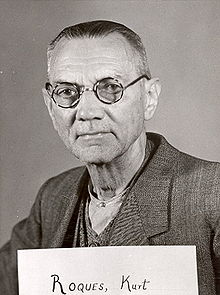RLB-Präsident
Appearance
(Redirected from RLB-Praesident)
This article needs additional citations for verification. (December 2009) |
| President of the Reichsluftschutzbund | |
|---|---|
| Reichsluftschutzbund Präsident | |
 Rank of the president | |
 Flag for the president | |
| Member of | Ministry of Aviation |
| Formation | 29 April 1933 |
| First holder | Hugo Grimme |
| Final holder | Friedrich Hirschhauer |
| Abolished | 1945 |
RLB-Präsident, also known as Reichsluftschutzbund Präsident or Präsident der RLB, was a Nazi paramilitary rank which was held by the supreme commander of the Reichsluftschutzbund. The position of RLB-Präsident was the highest rank of the Reichsluftschutzbund and was also considered a senior ministerial position within the Aviation Ministry of the Nazi Germany government.
The insignia for RLB-Präsident consisted of a white gold trimmed collar patch with three embroidered eagles. A thick gold shoulder board was also worn.
RLB-Präsident
[edit]| No. | Portrait | RLB-Präsident | Took office | Left office | Time in office | Ref. |
|---|---|---|---|---|---|---|
| 1 | Generalleutnant Hugo Grimme (1872–1943) | 29 April 1933 | 30 April 1936 | 3 years, 1 day | . | |
| 2 | Generalleutnant Karl von Roques (1880–1949) | 30 April 1936 | 30 May 1939 | 3 years, 30 days | . | |
| 3 | General der Flakartillerie Ludwig von Schröder (1884–1941) | 30 May 1939 | 3 June 1941 | 2 years, 4 days | . | |
| - | General-Hauptluftschutzführer Hermann Sautier Acting (as Chief of Staff) | 12 June 1941 | 1 August 1942 | 1 year, 50 days | [1][2] | |
| 4 | General der Flakartillerie Friedrich Hirschhauer (1883–1979) | 1 August 1942 | 31 January 1945 | 2 years, 183 days | . |
References
[edit]- ^ Central Intelligence Agency (May 1944). Who's Who in Nazi Germany (PDF) (4th ed.). New Oxford Street: Central Intelligence Agency. Archived from the original (PDF) on January 23, 2017. Retrieved 9 December 2018.
- ^ Diebel, Martin (2017). Atomkrieg und andere Katastrophen: Zivil- und Katastrophenschutz in der Bundesrepublik und Großbritannien nach 1945 (in German). Verlag Ferdinand Schöningh. p. 36. ISBN 978-3506787453.


![Hugo Grimme [de]](http://upload.wikimedia.org/wikipedia/commons/6/6d/No_image.png)

